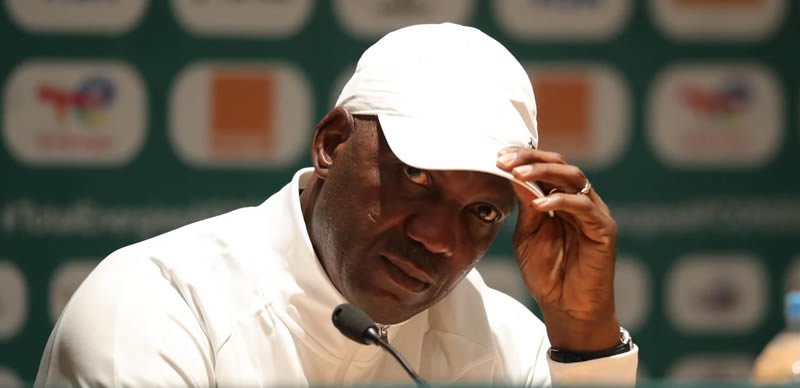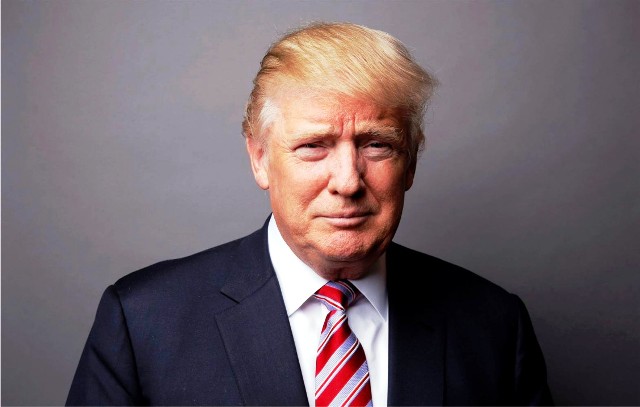Editorial
Task Before Eguavoen, Amuneke

Few days ago, the football ruling body in Nigeria, Nigeria Football Federation (NFF) confirmed the duo of ex-
internationals, Austin Eguavoen and Emmanuel Amuneke as substantive technical heads of the national team, Super Eagles. This followed the not-so- successful outing of the national team under the tutelage of Eguavoen in interim capacity at the recently concluded 33rd edition of the African Cup of Nations ( AFCON) tagged Cameroon 2021, and the failed attempt to engage Portuguese tactician, Jose Peseiro. While Eguavoen remains the Technical Adviser and Head of the coaching crew, Amuneke was drafted as the coach.
At the Cameroon 2021 Championship, Eguavoen and the Super Eagles, after flying off the blocks in impressive fashion ended up flattering to deceive. They won all their group matches to raise the expectations of not only Nigerians but their fans across the globe. But the Eagles came unstuck in the very first knock out stage and game against their counterparts from Tunisia.
That is why, we think that the combination of Eguavoen and Amuneke could not have come at a better time, especially as the final qualifying matches for Qatar 2022 World Cup looms by the corner. Indeed, the Super Eagles team, as presently constituted, boasts of young and enterprising talents that have the potential to become world beaters, if only technically and tactically sound minds could work to weave their talents into a consistent formidable unit in the field of play.
We are glad that the new gaffers played the game to the highest level and have proved themselves as technical managers with relative successes. Both played professional club football with reputable sides in Europe, played for the national team and won the Nations Cup in 1994, with Amuneke also winning the Olympic football gold medal in 1996.
As coaches, both have some cognate experience to fall back on. While Eguavoen has been in the saddle of the Super Eagles before now and has the record as the only coach to have seen the team eke out perfect record in group matches as the AFCON in more than one edition, the recent disappointment of Cameroon 2021 should be handy. Amuneke, on his part, has brought world youth football glory to the country as an assistant and substantive coach of the Golden Eaglets in 2013 and 2015. He also broke new grounds, leading the Taifa Stars of Tanzania to their second African Cup of Nations outing in 2019, 39 years after their debut outing in 1980.
Now, therefore, we think is the time for both coaches to bring their experiences to bear on the national team and steer it to greater height and glory, beginning with the momentous two-legged encounters with neighbours and archrivals, Ghana, next month. The Black Stars of Ghana are the last hurdle between Nigeria and an appearance at the next mundial and qualifying for the biggest football rendezvous in the world is non-negotiable. It is indeed an acid test for the Eagles’ handlers and inkling into what their tenure holds for the national team and Nigeria.
We expect Eguavoen and Amuneke to close ranks and work with mutual respect and unity of purpose to ensure that their names are not only written in gold but serve as positive milestones for indigenous coaches in their quest for opportunities in the continent and beyond. These we believe are achievable with clearly stated goals, programmes and methods, which should have long, medium and short term strategies.
Over the years, it is on record that the NFF tended to treat indigenous coaches with less respect than their expatriate counterparts. While we are not encouraging confrontational attitude or insubordination, we expect that, as professionals, the coaches have a clear contract with stipulated rule of engagement in place in order to avoid the cataclysmic developments that have inundated past arrangements.
Being ex-players, Eguavoen and Amuneke must be ready to enforce discipline in the Super Eagles without being unduly high handed in order to have and maintain a peaceful dressing room. In fact, the onus lies on the coaches to provide leadership and act as role models for the players, without hesitating to whip into line any one that steps out of order, no matter his status in the team.
Hassan Shehata, who won multiple Nations Cup title for Egypt, Djamel Belmadi of Algeria, who led Algeria to the title at the penultimate AFCON, our own late Stephen Keshi, who won with the Super Eagles in 2013 and Aliou Cisse, coach of current AFCON Champions, Teranga Lions of Senegal are some examples of indigenous coaches to have led their countries to glory. Taking some leaves off their books, especially, Cisse, who stuck to his beliefs and methods to finally achieve with Senegal, would not be a bad idea. The duo should strive to be shining examples of ideal local coaches with capacity.
Apart from a healthy working relationship between both men on and off the field, we demand fair and firm disposition from them in scouting, selecting and fielding players for the national team. The practice of favouritism or double standard should not find room in the choice of personnel to prosecute one match or another. Also, some Nigerian coaches have in the recent past run foul of FIFA rules and stand against corruption, match-fixing and other forms of bribery, Eguavoen and Amuneke must at all times maintain high moral grounds against any matter that may blemish their integrity.
The two coaches will, at the end of the day be judged by how far they would have taken the national team to the next level and their ability to identify, wean and integrate new players to the Super Eagles. We, therefore, think that while going for the best legs to represent the country in the national teams, products of the domestic league must not be forgotten players from the Nigerian Professional Football League, (NPFL) should not be outrightly dismissed as second class players but ought to be given ample opportunities to prove themselves among the litany of usually favoured foreign- based counterparts.
For sure, Nigerians are looking up to the coaches to bring positive vibes, especially better technical depth, good spirits and undivided commitment to the team. The Super Eagles are being expected to re-enact their exhilarating performances of the past and hopefully hit the form that saw them captivate the world at Tunisia ’94 AFCON and the FIFA World Cup of 1994 in the United States of America.
As the country looks to be part of the party come Qatar 2022 World Cup, Eguavoen and Amuneke must make a loud and clear statement of intent with the upcoming final qualifiers against the Black Stars of Ghana in March.
Editorial
New Federal Varsity In Ogoni

President Bola Ahmed Tinubu has made history by signing into law a bill that establishes the Federal Univer-
sity of Environment and Technology in Ogoni, Rivers State. This significant occasion marks a bold step forward not only for the Ogoni people but also for the Niger Delta region and Nigeria as a whole. It signifies a commitment to education, environmental sustainability, and technological advancement.
For the Ogonis, who have long been impacted by environmental challenges, the university represents a beacon of hope. It is more than just bricks and mortar; it is a symbol of empowerment and a pathway to a brighter future. This development is akin to a seed, planted with the promise of a flourishing harvest of skilled professionals.
The university’s emphasis on environmental technology is extremely important, especially given Nigeria’s climate crisis. Education plays a crucial role in developing sustainable solutions. The institution will provide students with the necessary skills and knowledge to address the environmental challenges affecting the Niger Delta region and beyond. This will have a momentous impact.
Signing the bill, the President praised the Ogoni people’s resilience and unity. He stressed that the institution would mark a “significant milestone in our national journey towards environment justice, education and sustainable development”. Tinubu said the university is a reaffirmation of his administration’s “unwavering commitment to the people of Ogoni, the Niger Delta and the nation as a whole. For decades, the Ogoni people have been at the forefront of fight for environmental restoration and sustainable development, shaping both national and global conversation of these critical issues.
“By signing this bill into law, we are taking a decisive step towards addressing historical grievances and creating new opportunities for learning, growth and prosperity. The university will serve as a centre of excellence, equipping young Nigerians with the knowledge and skill to tackle present environmental challenges, drive clean energy solutions and contribute to our national sustainable economic development.”
We commend President Tinubu for his visionary decision to establish the much-needed institution aimed at fostering development and progress. This initiative is a testament to his commitment to addressing critical social and economic knots and creating opportunities that will benefit the people. The President has laid a solid foundation for sustainable growth while demonstrating a genuine desire to empower and advance the nation’s collective interests.
In addition to his commendable action, we applaud Tinubu for initiating peace talks to bring stability and reconciliation to the troubled area. The decision to engage in constructive dialogue demonstrates a deep understanding of the relevance of inclusive governance and the role of peace in fostering meaningful development. For decades, Ogoni has endured turmoil and neglect, impeding its potential and the return of oil exploration activities.
By opening the door to peaceful negotiations, the President has made a bold and necessary move towards healing fractured relationships and fostering trust among stakeholders. This initiative holds the promise of ensuring that the voices and needs of the Ogonis are heard and respected. We urge all parties involved to seize this golden opportunity for lasting peace and progress. It is only through unity and mutual respect that the full potential of Ogoni, and by extension the nation, can be realised.
As steps are taken to acknowledge and remediate the damage caused by years of oil exploration and production, the Ogonis must reciprocate Mr. President’s gesture by fostering a climate of equanimity and stability. This will ultimately pave the way for the resumption of oil exploration and production. This is not a call to forget the past, but a pragmatic recognition that meaningful change and sustainable development require a collaborative approach.
The Federal Government has a responsibility to ensure that all academic disciplines offered by the new university are fully accredited to maintain the integrity and quality of the school. Without proper accreditation, the institution risks producing graduates who are ill-equipped to compete in the global workforce or contribute substantially to national development. Accreditation serves as a benchmark that ensures programmes meet academic standards and adhere to best practices across various fields of study.
Staff recruitment should be conducted carefully, as the individuals brought into a team can greatly influence an organisation’s performance, culture, and long-term success. The primary focus of recruitment efforts at the university should be on attracting the best candidates who possess the necessary skills, qualifications, experience, and values. Merit should be the guiding principle in decision-making throughout the hiring process, rather than favouritism or personal bias.
For a nation to thrive in the 21st century, a strong higher education system is not only desirable, but essential. Universities serve as the catalysts for innovation, the breeding grounds for future leaders, and the foundations of a knowledge-based economy. The Federal Government must acknowledge this vital role and take intentional actions to properly fund the university in Ogoni and develop infrastructure to ensure it meets international standards. Neglecting this responsibility would put its future prosperity and global competitiveness at risk.
This institution must not suffer the same fate as other federally-owned universities that have been left to decay. That will be a disservice to its purpose and potential. Many government-owned universities in the country have struggled with dilapidated infrastructure, underfunding, insufficient staffing, and interruptions caused by industrial actions due to unpaid wages or poor working conditions. These challenges have led to declining standards in education, putting both students and staff at a disadvantage. The Ogoni University must not be another victim of this worrying trend.
Editorial
HIV, Transiting From Donor Dependence

The initial announcement by United States President, Donald Trump, to cut funding for international
HIV/AIDS initiatives sent shockwaves through the global health community. In Nigeria, a country facing a significant HIV/AIDS burden, the potential consequences were dire. However, the subsequent waiver granted by the administration has provided a lifeline for the millions of Nigerians who rely on the President’s Emergency Plan for AIDS Relief (PEPFAR) for their treatment and support.
PEPFAR has been an important partner in Nigeria’s fight against HIV/AIDS. Since its inception in 2003, PEPFAR has committed more than $7.8 billion to the country, catering to approximately 90 per cent of HIV treatment requirements. With this funding, Nigeria has been able to enhance its HIV prevention, treatment and support services and has witnessed a reduction in HIV/AIDS deaths.
The waiver granted by the Trump administration guarantees that PEPFAR’s life-saving medicines and medical services will continue to reach the needy. Antiretrovirals (ARVs) are the most common type of medicine used to treat HIV and reduce the virus’ spread. Through the provision of ARVs, PEPFAR helps prevent the spread of HIV and enhances the quality of life of those with the condition.
Although Nigeria was recently exempted from the requirement, the signs are evident: the country has to graduate from dependence on donor funds for its HIV/AIDS control programmes. Over the years, partners including the U.S. government have been central to the provision of treatment to people living with the virus. However, it is time for Nigeria to own its national response to HIV/AIDS.
Nigeria’s HIV/AIDS burden remains critical, accounting for 10 per cent of the global total. In 2023 alone, there were 75,000 new infections and 45,000 HIV-related deaths. The battle against Mother-to-Child Transmission remains challenging, with only 35 per cent of the target 75 per cent being met. Nearly 1.7 million Nigerian children have been orphaned due to HIV. Vulnerable populations, especially women and children, continue to disproportionately suffer.
To transition away from donor dependence, a multifaceted approach is necessary. Firstly, the country must increase its domestic financing for HIV/AIDS programmes. This can be accomplished through innovative funding mechanisms, such as leveraging public-private partnerships and exploring local revenue sources. Secondly, the government needs to strengthen its healthcare system to ensure equitable access to testing, treatment, and care. This involves expanding access to antiretroviral drugs, investing in community-based models, and addressing the stigma associated with HIV.
Thirdly, Nigeria must prioritise prevention efforts. This entails promoting condom use, providing comprehensive sexual education, and increasing awareness about the risks and modes of transmission. By focusing on prevention, the country can decrease the incidence of HIV infections and ultimately lessen the burden on its healthcare system.
Finally, Nigeria should develop a sustainable human resource strategy for its HIV/AIDS response. This involves training and equipping healthcare workers, engaging community volunteers, and empowering people living with HIV to advocate for their rights. A well-trained workforce is essential for delivering high-quality services and ensuring the long-term success of the response.
The transition beyond donor dependence is a complex but necessary journey for the country. By increasing domestic financing, strengthening healthcare systems, prioritising prevention, and investing in its human resources, the country can create a sustainable and effective response to HIV/AIDS. Also, the government should consider alternative funding mechanisms, such as increased domestic funding, public-private partnerships, and philanthropic initiatives. The time to act is now, for the well-being of present and future generations.
Nigeria’s National Agency for the Control of AIDS (NACA) has made momentous strides in combating HIV/AIDS, including expanding access to testing, treatment, and education. However, challenges persist, hindering the effectiveness of these efforts.
One major obstacle is limited access to healthcare facilities, particularly in rural areas. This impedes timely diagnosis and treatment, reducing the likelihood of optimal outcomes for those living with HIV. Additionally, stigma surrounding the disease remains a formidable barrier, preventing individuals from seeking testing and care. Inadequate awareness campaigns further contribute to low testing rates and delayed diagnosis.
Addressing these challenges requires concerted action by the government and stakeholders. Allocation of adequate funding is crucial to expand healthcare infrastructure and ensure the availability of essential services. Moreover, targeted interventions to reduce stigma and promote awareness are vital for increasing testing and early detection.
Collaboration between civil society organisations and grassroots movements is also essential for advocating for protection of HIV funding. Advocacy campaigns can mobilise public support and pressure lawmakers to prioritise the fight against HIV/AIDS. By addressing these challenges and ensuring sustainable funding, Nigeria can depend less on donor countries, drastically reduce HIV transmission, and provide the necessary care to those affected by the disease.
Editorial
Israel-Gaza War: Sustaining The Ceasefire

-
Business5 days ago
NCDMB Assures Samsung Of Support On Oil/gas Industry Projects
-
Sports5 days ago
NSC, NFF Visit proposed Abuja hotel, training pitch
-
News2 days ago
Protests Mar Oil Resumption Congress In Ogoni
-

 News2 days ago
News2 days agoOgonis Commend Tinubu Over Dialogue Meeting
-
Nation5 days ago
Simplified Leader Lauds Knight For Building Church
-
Opinion5 days ago
It’s ECOWAS Of People, Not Coup Plotters
-

 Politics2 days ago
Politics2 days agoBode George Kicks Against State Creation, Opts For True Federalism
-

 Education2 days ago
Education2 days agoEbonyi NUT Declares Indefinite Strike In Seven LGAs

